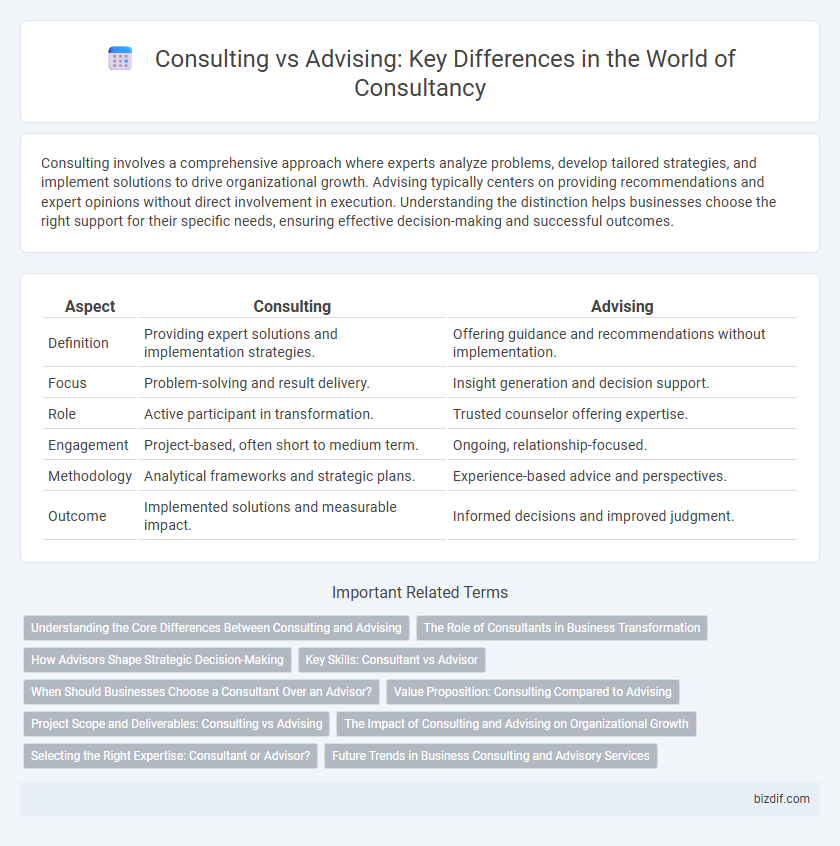Consulting involves a comprehensive approach where experts analyze problems, develop tailored strategies, and implement solutions to drive organizational growth. Advising typically centers on providing recommendations and expert opinions without direct involvement in execution. Understanding the distinction helps businesses choose the right support for their specific needs, ensuring effective decision-making and successful outcomes.
Table of Comparison
| Aspect | Consulting | Advising |
|---|---|---|
| Definition | Providing expert solutions and implementation strategies. | Offering guidance and recommendations without implementation. |
| Focus | Problem-solving and result delivery. | Insight generation and decision support. |
| Role | Active participant in transformation. | Trusted counselor offering expertise. |
| Engagement | Project-based, often short to medium term. | Ongoing, relationship-focused. |
| Methodology | Analytical frameworks and strategic plans. | Experience-based advice and perspectives. |
| Outcome | Implemented solutions and measurable impact. | Informed decisions and improved judgment. |
Understanding the Core Differences Between Consulting and Advising
Consulting involves diagnosing complex organizational issues and delivering strategic solutions tailored to client needs, often integrating industry-specific expertise and data analysis. Advising typically emphasizes offering guidance based on experience or expertise, helping clients make informed decisions without direct intervention in implementation. Understanding these core differences enables businesses to select either consultancy or advisory services aligned with their operational goals and resource requirements.
The Role of Consultants in Business Transformation
Consultants play a critical role in business transformation by delivering expert analysis, strategic planning, and implementation support to drive organizational change. Unlike advisors who primarily offer recommendations, consultants actively engage in diagnosing problems, designing solutions, and executing change initiatives to achieve measurable business outcomes. Their hands-on involvement ensures alignment between transformation goals and operational capabilities, fostering sustainable growth and competitive advantage.
How Advisors Shape Strategic Decision-Making
Advisors influence strategic decision-making by providing expert insights tailored to an organization's unique challenges and goals, enabling leaders to evaluate options with greater clarity. Their role involves fostering critical thinking and offering unbiased perspectives that help identify risks and opportunities in complex business environments. By shaping the decision-making process, advisors contribute to sustainable growth and long-term competitive advantage.
Key Skills: Consultant vs Advisor
Consultants excel in problem-solving, project management, and data analysis, enabling them to deliver tailored solutions and implement strategic plans. Advisors prioritize relationship-building, subject matter expertise, and communication skills to provide ongoing guidance and foster trust with clients. Both roles require critical thinking, but consultants focus more on execution, while advisors emphasize insight and counsel.
When Should Businesses Choose a Consultant Over an Advisor?
Businesses should choose a consultant over an advisor when they require specialized expertise to solve complex problems or implement specific projects, as consultants provide actionable strategies and hands-on support. Consultants offer tailored solutions and often take an active role in execution, making them ideal for organizations seeking measurable outcomes and process improvements. In contrast, advisors typically deliver high-level guidance without direct involvement in implementation.
Value Proposition: Consulting Compared to Advising
Consulting delivers a structured, data-driven approach to solving complex business challenges, leveraging industry expertise and analytic frameworks to drive measurable outcomes. Advising typically offers personalized recommendations based on experience and judgment but may lack the comprehensive implementation support and strategic alignment found in consulting. The value proposition of consulting lies in its capacity to integrate diagnostic analysis, strategic planning, and execution support, ensuring sustainable impact beyond mere advice.
Project Scope and Deliverables: Consulting vs Advising
Consulting involves a defined project scope with specific deliverables tailored to solving complex business challenges, often requiring in-depth analysis and strategic implementation. Advising typically offers broader guidance without fixed deliverables, focusing on expert recommendations and ongoing support to inform decision-making. Clear distinction in project scope and deliverables ensures the choice between consulting and advising aligns with organizational goals and resource allocation.
The Impact of Consulting and Advising on Organizational Growth
Consulting drives organizational growth by delivering actionable strategies tailored to specific business challenges, enabling companies to optimize operations and increase efficiency. Advising complements this by offering expert insights that inform decision-making processes and foster long-term strategic vision. Together, consulting and advising enhance innovation, risk management, and overall competitive advantage within dynamic markets.
Selecting the Right Expertise: Consultant or Advisor?
Selecting the right expertise depends on the project scope and desired outcomes; consultants deliver specialized solutions through in-depth analysis and implementation, while advisors offer strategic guidance based on industry experience and best practices. Consultants engage directly with operational challenges, providing actionable recommendations tailored to specific business needs, whereas advisors focus on offering long-term insight and risk assessment to inform leadership decisions. Understanding these distinctions empowers organizations to align expertise with objectives, optimizing resource allocation and maximizing impact.
Future Trends in Business Consulting and Advisory Services
Future trends in business consulting and advisory services emphasize the integration of data analytics, artificial intelligence, and digital transformation to drive decision-making and enhance client outcomes. Consulting increasingly involves strategic implementation and hands-on problem solving, while advising focuses on providing expert recommendations tailored to evolving market dynamics. Organizations seek consultants and advisors who can anticipate industry disruption, foster innovation, and deliver actionable insights for sustainable growth.
Consulting vs Advising Infographic

 bizdif.com
bizdif.com